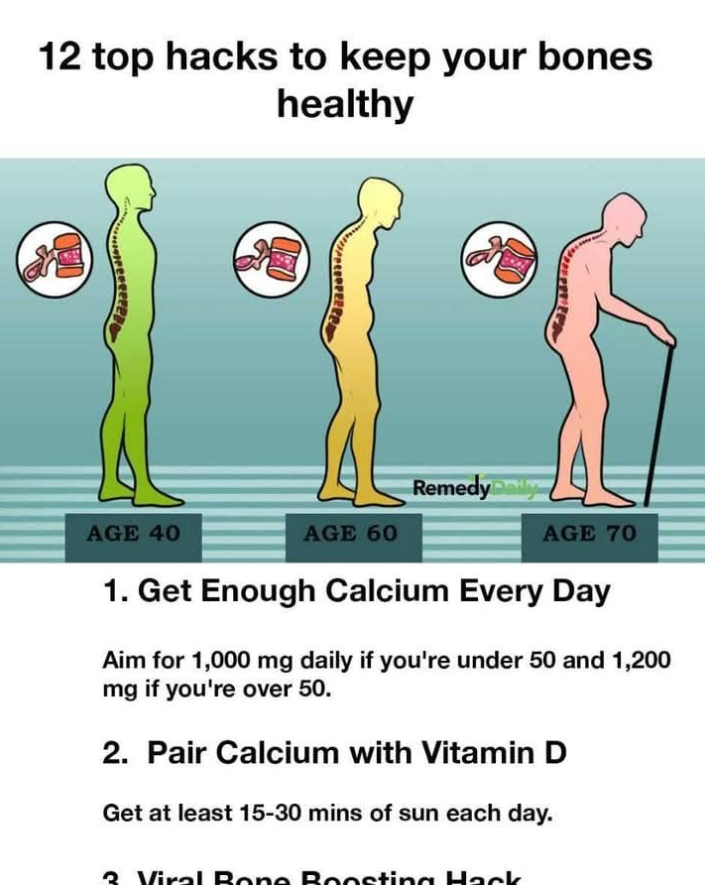-
1 cup Calcium-rich foods (dairy, leafy greens, almonds, tofu)
-
1 daily dose of Vitamin D (sunlight or supplements)
-
1 handful of Magnesium-rich nuts and seeds
-
A sprinkle of Vitamin K (found in spinach, kale, broccoli)
-
2 tbsp of healthy fats (avocados, olive oil)
-
A generous portion of weight-bearing exercise
-
Daily hydration (preferably water)
-
Pinch of protein in every meal
-
A dash of zinc (pumpkin seeds, lentils)
-
7–8 hours of quality sleep
-
1 serving of reduced caffeine and soda intake
-
A dollop of balance and flexibility training
Preparation (How to Implement These Hacks):
-
Start your day with a calcium boost – Think yogurt, fortified plant milk, or chia pudding.
-
Spend 10–15 minutes in morning sunlight to naturally activate vitamin D production.
-
Add leafy greens and nuts to meals—magnesium and vitamin K are crucial cofactors for calcium absorption.
-
Incorporate resistance training (e.g., walking, light weights, yoga) at least 3x per week.
-
Snack smart—choose almonds, hummus, or a boiled egg instead of sugary treats.
-
Limit carbonated drinks, especially cola—they leach calcium from bones.
-
Reduce excessive salt and processed foods—they cause calcium loss via urine.
-
Balance your plate with protein at each meal to maintain bone matrix integrity.
-
Stay hydrated—bone cells need fluid to function properly.
-
Take a vitamin D supplement if you’re not getting enough sunlight (especially in winter).
-
Avoid smoking and limit alcohol—both reduce bone mineral density.
-
Do balance exercises like tai chi or balance boards to reduce fall risk and fractures.
Serving and Storage Tips:
-
Serve daily: These habits are most effective when done consistently.
-
Store as lifestyle habits—not quick fixes. Think prevention over cure.
-
Pair with annual bone density check-ups, especially after age 50 or if at risk.
Variants (Alternative Approaches):
-
Vegan-friendly version: Use fortified plant-based milks, tofu, and legumes.
-
Gluten-free approach: Stick to whole, natural foods and avoid processed gluten substitutes high in sodium.
-
Busy-lifestyle hack: Pre-mix snacks (nuts, dried fruit, seeds) in zip bags for grab-and-go bone-boosting fuel.
FAQ:
Q: How much calcium do I need daily?
A: Adults need about 1,000 mg per day; women over 50 and men over 70 need 1,200 mg.
Q: Can I get enough vitamin D from food alone?
A: It’s tough. You may need a supplement, especially if you live in low-sunlight areas.
Q: Is dairy the only good calcium source?
A: Not at all! Leafy greens, sesame seeds, tofu, and fortified plant milks are excellent too.
Q: Does caffeine really harm bones?
A: Excessive caffeine can slightly reduce calcium absorption, especially without adequate intake—moderation is key.
Q: At what age should I start focusing on bone health?
A: Immediately! Peak bone mass is built by age 30, but maintenance matters at every age.
